
OPINION:
Despite the fanfare surrounding wind and solar, the world’s dependency on fossil fuels is increasing. Last week, Saudi Aramco CEO Amin Nasser said that the world is now “transitioning to coal.”
Saad al-Kaabi, Qatar’s energy minister, says: “Many countries particularly in Europe which had been strong advocates of green energy and carbon-free future have made a sudden and sharp U-turn. Today, coal burning is once again on the rise reaching its highest levels since 2014.”
They are right. Global coal demand will reach a historic high in 2022, similar to 2013’s record levels. According to the International Energy Agency, “Global coal consumption is forecast to rise by 0.7 percent in 2022 to 8 billion tons. … Coal consumption in the European Union is expected to rise by seven percent in 2022 on top of last year’s 14 percent jump.”
Coal will continue to be a sought-after energy source as “rising gas prices after 2030 will make existing coal-fired generation more economic,” the IEA says. Global energy demand will grow by 47% from now through 2050, and oil is expected to be the major source of energy.
Analysts are projecting “a huge gas-to-coal fuel transition in power and industrial sectors” of Europe. Yes, not gas to renewables, but gas to coal. In fact, the European Union’s coal consumption grew 16% year-on-year for the first half of 2022. European countries imported 7.9 million tons of thermal coal in June, more than doubling year-on-year. Annual coal imports are expected to reach 100 million tons by the end of the year, the highest since 2017.
Even in the most developed economies of the West like Germany and the United Kingdom, fossil fuels continue to dominate as the only dependable source of energy. Germany is set to become the third-highest importer of Indonesian coal in 2023, ranked just below coal-guzzling China and India.
AP says, “Coal, long treated as a legacy fuel in Europe, is now helping the continent safeguard its power supply and cope with the dramatic rise in natural gas prices caused by the war.” Rather than wind or solar, it is coal that is keeping the lights on in Europe.
Taking stock of the tremendous performance of coal, a Shaw and Partners senior analyst commented: “Who would have thought dirty ol’ coal would have been the best-performing equities in the last financial year? So far this financial year it’s also the best-performing sector.”
Given this reality, can Western economies protect themselves from being victims of their own green policies that neither produce the required energy nor save the planet?
Many Western leaders are not ready to admit that this is a misery self-inflicted by their green-energy obsession that compromised the supply of fossil fuels.
The global green energy movement’s primary goal is to make economies transition to renewable sources of energy, a move that some believe will help save the planet from climate change. But sources like wind, solar, and biomass are neither reliable nor affordable — nor even “renewable.” These indisputable facts were disregarded as Western economies continued to make their so-called energy transition.
As a result, much of Europe, the U.K. and North America find themselves in energy turmoil.
Instead of harvesting their abundance of fossil fuels, these economies are in a state of lamentation, desperate for the procurement of the very fuel sources they once despised.
Last week, the White House said it was concerned about a cut in oil production announced by OPEC, despite the Biden administration’s denigration of domestic oil. In Europe, leaders are livid over a gas shortage, another fossil fuel that they claim is bad for the planet.
Qatar’s Saad Al-Kaabi says that European “green” policies are responsible for high energy prices and that leaders in the West “don’t have a plan.” Energy shortages have forced them to return to the most dependable sources — coal and oil. They are now scampering to ensure energy security for winter, when many believe likely that there will be power blackouts in the U.K. and Germany.
The world is now transitioning to fossil fuels — not renewables, despite vast amounts of time and money spent on developing wind and solar technologies.
• Vijay Jayaraj is a research associate at the CO2 Coalition, Arlington, Virginia. He holds a master’s degree in environmental sciences from the University of East Anglia and resides in India.
(This article is generated through the syndicated feeds, Financetin doesn’t own any part of this article)
